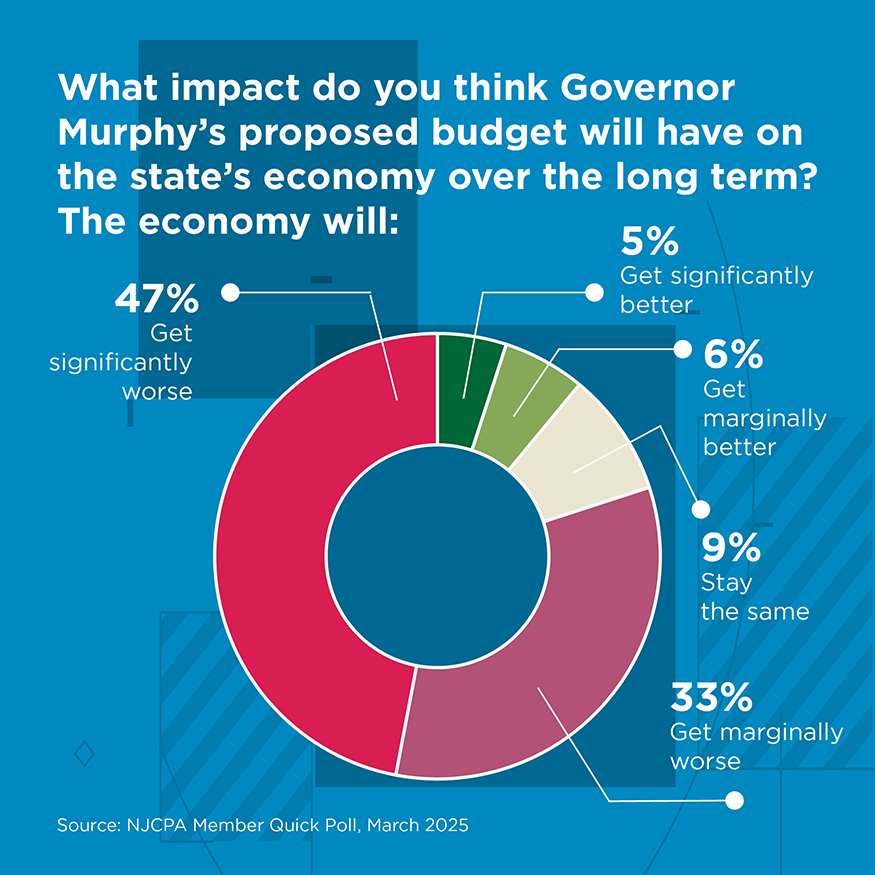Budget season is in full swing here in the great Garden State. As reported by NJBIZ, hearings are underway as the Legislature considers Gov. Phil Murphy’s proposed Fiscal Year 2026 $58 billion spending plan.
And this particular budget season is a tense one – with tight economic conditions, a structural deficit and a political backdrop that includes Murphy’s final year in office (and final budget) as well as the race to succeed him ratcheting up, along with the second Trump administration.
In February, just after the governor unveiled his budget plan, Garden State Initiative (GSI) released a new report titled, “When in a Hole, Stop Digging: New Jersey’s Budget Woes and How to Address Them,” by Thad Calabrese, professor of Public and Nonprofit Financial Management at the Robert F. Wagner Graduate School of Public Service at New York University. GSI is an independent, non-partisan think tank.
The report examines the state’s structural deficit and allocation of the surplus and COVID funds – as well as detailing spending by branches of the government.
“When in a Hole, Stop Digging” lays out several recommendations for policy changes including:
- Reducing the tax burden on individuals and businesses to boost competitiveness with other states that are currently drawing in families and companies.
- Focusing state spending on essential public services while cutting back on non-essential areas.
- Ensuring the state’s budget is fiscally balanced, where annual revenues fully cover annual expenditures.
- Enacting reforms to the state’s pension and retiree health care systems to reduce the annual costs. A likely solution will involve higher worker contributions, longer vesting periods and less generous benefits.
“New Jersey’s budget is structurally out of balance, with spending growing faster than revenue, forcing the state to dip into savings to cover regular government costs,” Calabrese wrote in the report’s conclusion. “Federal COVID relief funds temporarily masked this issue, with substantial amounts directed not only to public health but also to other unrelated expenditures.
“In recent years, New Jersey has significantly raised taxes, especially on higher-income individuals and businesses. As a result, the state already ranks poorly in terms of business-friendliness and is unlikely to attract new or expanding companies without major reforms to its tax and spending policies.”
On the record
“This report clearly presents the state’s return on investment for taxpayers, and I think the taxpayers will be disappointed” said GSI President Audrey Lane in a February 26 press release. “While other states took the opportunity to use COVID relief funds to provide guardrails for policy reform that would have improved affordability for all, New Jersey squandered its opportunity.”
Lane recommended that lawmakers pay attention to the policy recommendations Calabrese made — especially as the budget season ramps up.
“The report clearly states New Jersey’s critical economic challenges and presents a clear, practical plan to begin addressing the downward trajectory,” said Lane.
Read the “When in a Hole, Stop Digging: New Jersey’s Budget Woes and How to Address Them” report here.
NJBIZ recently spoke to Lane about the report, the budget and more.
At the top of the conversation, Lane noted that the timing of the report was quite intentional. The publication also follows up on last year’s GSI report about the looming fiscal cliff.
“In our organization, we like to put data, facts and figures behind these ideas. And so that was a deeper dive into – when are we running out of money; what are our sources of revenue in this state; and what can we do to prevent it?” Lane told NJBIZ. “And then, this year I thought – it’s a year later, we’ve got one more year of financial data out there. Again, I like to have the facts and figures to talk about what’s really going on around budget season.”
She said that the report wanted to focus on what the return on the investment for taxpayers was with COVID money, as well as how much the surplus is expected to be drawn down – and more.
Burden on business
“What’s the main topline/main summary of what this report found?” NJBIZ asked.
“The report found that, unfortunately, our return on investment for some of the larger sectors in our state – transportation, education and programs to combat poverty – was poor or disappointing,” said Lane. “And I think that’s the topline. I hate to be negative. I really do.”
She said she hoped that policymakers would look at the report’s recommendations on where to go from here.
Lane then spoke about how the state utilized its COVID money.
“If we just look, for example, to our neighbor – Pennsylvania. They made very good use of their surplus money,” said Lane. “And what they did was they used it as a backstop for a structural change to their corporate business tax – and they implemented corporate business tax reform that’s paying dividends for them and increasing revenue in the state.”

Of course, last year a major budget battle centered around the corporate tax rate. Business groups vehemently opposed the 2.5% surtax (the corporate transit fee) that was passed and signed into law. The funds support NJ Transit, which was facing a fiscal cliff.
“We screamed from the rooftops about this last year. It would have been a great investment for the future of the state to have looked at the corporate business tax reform,” she said. “As you lower corporate business taxes, inevitably and time and time again, the state revenue goes up. We can look at Indiana; we can look at Ohio; we can look at Iowa; we can look at North Carolina. And in every case, as you step down the corporate business tax intentionally, revenue went up.”
‘Death by a million cuts’
She described watching other states lower corporate business tax rates while New Jersey’s went up as “maddening.”
“These things don’t happen in isolation. We can’t just raise taxes. And that’s something that this report emphasizes. It’s not just about revenue,” Lane continued. “It’s about spending. We actually have increased revenue in some areas. But it has to go hand-in-hand with spending cuts. And I have not heard a single word about spending cuts [in the budget address/proposal].”

“What’s your take on some of the fee increases/revenue raisers – taxes, however you want to characterize them, on things from alcohol to the warehouse tax and other items?” NJBIZ asked.
“The so-called sin taxes are going to disproportionately affect those in lower income levels. That’s a fact,” said Lane. “And that’s the exact population that’s already struggling with affordability in our state.
“The buck-a-truck tax that was floated last year – is now proposed at $2. As we know, corporations don’t pay taxes – people will pay them. It will be a pass along. So, every one of these incremental fee increases are just hitting the residents of New Jersey, who are already struggling with affordability.
“These – I’ll call it ‘death by a million cuts’ – will just lead corporations to grow in other states. Where they already are,” said Lane. “From an affordability and tax standpoint, it doesn’t make sense right now to grow in New Jersey.”
The good news
She said what’s bad about the problem is that it exists.
“The good is that this is solvable,” said Lane. “We can pivot here. I do not see that happening – as the governor is finishing out his term. But there’s always hope. North Carolina made remarkable changes within one administration – and continues on that. This is a template for a change – and New Jersey is ripe for it.”
Lane stressed that New Jersey has so much to offer, from its prime location to its top-tier education system and more.
“Not only is New Jersey my home, my family’s home – but it’s a gem,” said Lane. “We are poised for growth like none other. I think that’s what’s so frustrating – but also so energizing – is that there’s the opportunity for change and growth. If we didn’t have potential, I wouldn’t be so energized. This state has so much to offer and so much potential.
“And just with some policy changes, we could be on the right course – and follow the growth that a lot of states on the East Coast have seen over the past five to 10 years.”
The post Amid $58B proposal, NJBIZ explores ‘budget woes’ report with GSI appeared first on NJBIZ.












